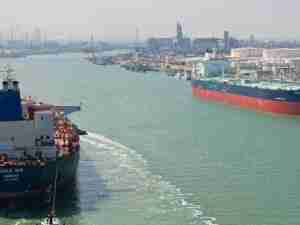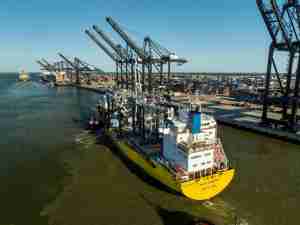Transnet SOC Ltd., South Africa’s state-owned ports and freight-rail company, is manually processing container shipments in the continent’s biggest port after an alleged cyber attack crippled its computer systems.
The company had to switch from the software system developed by Navis, which was acquired by Accel-KKR this month, to asking shippers to supply physical copies of the so-called Container Terminal Order in Durban, according to a notice Transnet sent to customers.
That’s hit the movement of cargo in a port that handles 60% of the nation’s shipments. Should the disruption extend, it will be the third obstacle to South Africa’s economic recovery this year after the pandemic, and last week’s deadly riots. While auto shipments have slowed, exports of citrus fruits from South Africa—the biggest seller of the fruit after Spain—came to a grinding halt.
“You can imagine instead of making a telephone call you are running around to the corner with a piece of paper,” said David Watts, a consultant at the South African Association of Freight Forwarders. “It’s affecting us in a huge way because at the moment nothing much is moving. If the situation does not improve, over a lengthy period, it could be extremely disastrous.”
Transnet on Thursday said container terminals stopped operations because of a malfunction in its computer network, though its rail, pipeline and engineering units are working as normal. On Friday the company said it had identified the source of the problem, which the government has referred to as a cyber attack, and was working to minimize the impact. It didn’t disclose details.
Transnet operates sub-Saharan Africa’s largest port in Durban, and Richards Bay, the biggest single-site terminal for bulk shipments. Most of the operations are run on the Navis N4 terminal operating systems, that helps the port operator monitor and manage everything from loading cargo to moving ships.
Because of the disruption Transnet “shut down all systems, including the servers running the N4 terminal application,” Navis said in an emailed response. “The source of the disruption is not related to Navis.”
Transnet’s website remained offline Friday. The company is prioritizing the export of reefer containers, which carry time sensitive cargo, via the Durban port as the citrus season is nearing its peak.
“We cannot export anything at the moment because the operations are at a standstill,” said Mitchell Brooke, development manager at the Citrus Growers Association. “That’s a big problem, a big challenge for us because we are sitting at the peak of our season and we can’t get product onto the market.”
READ: Akamai Says It Has Fixed Issues That Affected Multiple Websites
Transnet said it has started loading two export-bound vessels and would soon embark on filling so-called reefer containers. The utility didn’t say when its operations would be back to normal.
The disruption is the second in about a week. Transnet declared force majeure on its Natcor line, which links the east coast city of Durban with the towns of Port Shepstone, Kroonstad, Richards Bay and the main economic hub of Gauteng, because of riots in parts of the country earlier this month.
The authorities are investigating “whether the cyber attack on Transnet is linked to the unrest,” acting Minister in the Presidency Khumbudzo Ntshavheni told reporters in Pretoria Thursday afternoon. “Currently we are treating it as an unrelated event.”
The United National Transport Union urged President Cyril Ramaphosa to instruct law-enforcement agencies to take “decisive action to protect Transnet” from sabotage, vandalism and criminality.
Durban handled about 3 million twenty-foot equivalent unit of containers in 2019. Manually processing so many containers means transporters are witnessing a backlog, according to Dave Logan, chief executive officer at South Africa Association of Freight Forwarders. The port needs to get Navis running soon, he said.










